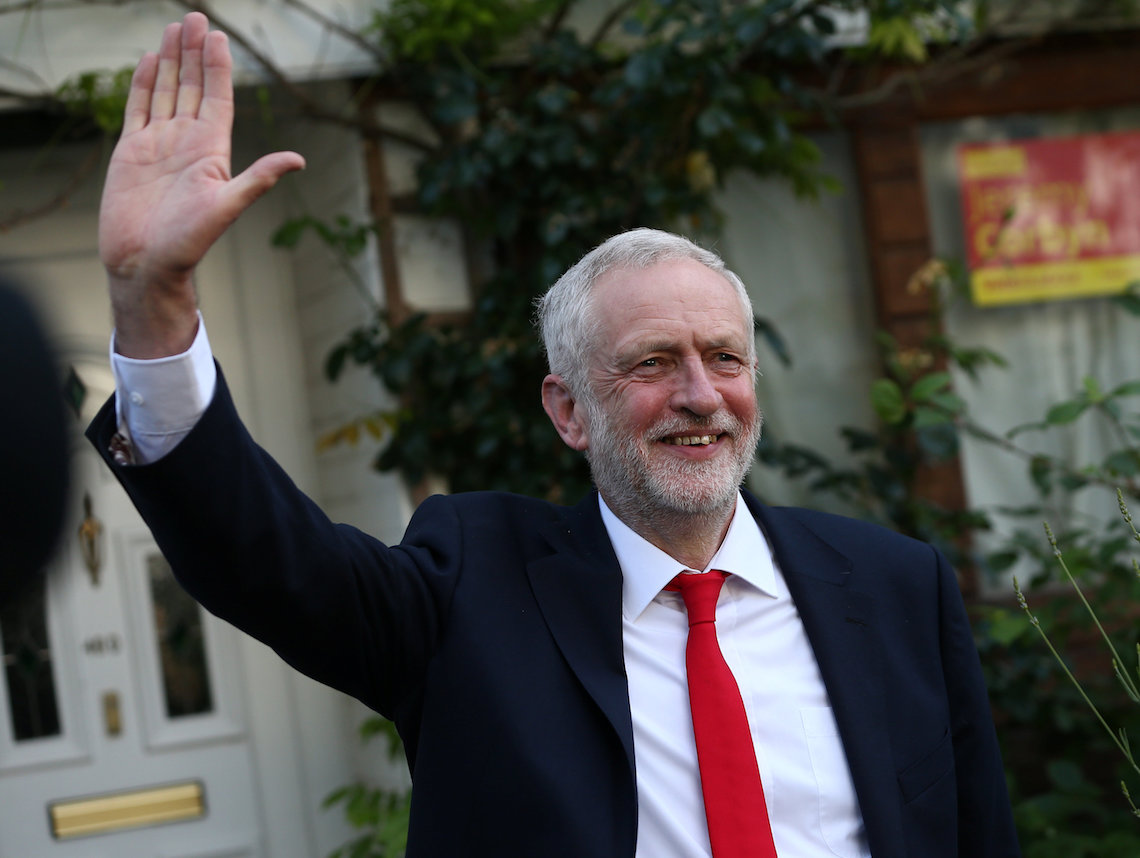 Jeremy Corbyn, leader of Britain’s opposition Labour Party, leaves his home on the morning after Britain’s election in London, Britain, on June 9. Photo by Neil Hall/Reuters
Jeremy Corbyn, leader of Britain’s opposition Labour Party, leaves his home on the morning after Britain’s election in London, Britain, on June 9. Photo by Neil Hall/Reuters As British voters went to the polls in a fateful Thursday election, the results were a nail biter that left Tory Prime Minister’s House of Commons majority and prime ministership hanging in the balance.
New York Times columnist Roger Cohen a few days earlier came out in an opinion piece (“A Case for Jeremy Corbyn, June 5) outright endorsing not only the Labour Party but radical Labour Party leader PM Jeremy Corbyn.
He’s against incumbent May not only for trying to preserve the U.K.-U.S. “special relationship” during the turbulent times of the Trump Administration, but for doing so in a way that Cohen deems, let’s be frank, unseemly sucking up to President Donald Trump.
Cohen, an important columnist, has a right to his opinion. But he was sucking up to Jeremy Corbyn and this is deplorable and, indeed, despicable and a threat to democracy in troubled times.
The UK election campaign occurred in an election atmosphere not only permeated by anxieties over renewed terrorism but in a miasma of anti-Semitism.
At the Bear Pit, an outdoor popular venue in Bristol, a giant campaign banner showed Prime Minister May in Star of David-shaped earrings, which some Jewish observers called “anti-Semitic.” The banner listed positive statements about Labour Party leader Corbyn and negative ones about May. One Jewish Bristol citizen asked, “I can’t believe stuff I haven’t heard of, or seen since I was a child is now happening again. It makes me sick.”
In Surrey, Alex Goldberg, the Jewish Chaplain at the University of Surrey and Chaplain to Surrey Police, said in a post on Facebook Sunday that he is proud of his daughter, Hannah, “for standing up to sexism, racism and religious abuse,” but was “Less proud of the police service that I have worked with for over two decades in failing to respond to three girls being attacked and racially abused.” Hannah Goldberg and her two friends, who her father said were identifiable as religious Jews due to their long skirts, were in a London-area park on May 27 when they were attacked by teens playing basketball. A bystander call the police, which did not show up for two hours, pleading a communications mix up.
According to London’s Jewish Chronicle, in Manchester, where the terrible terror attack of a few weeks ago claimed 22 lives, police reported that arson attacks on two kosher restaurants that are “anti-Semitic hate crimes” occurred within five days of each other.
The Labour campaign was also embarrassed by revelations that in 2002 Corbyn addressed a rally attended by 300 members of extremist group Al Muhajiroun where audience members shouted slogans calling for Israelis to be gassed. Khuram Butt, one of the three London Bridge/Borough Market murderers, was a supporter of and an associate Al Muhajiroun leader and jailed hate preacher Anjem Choudary.
Corbyn’s left-wing views are not the problem. It is his beyond-the-bounds apologetics for Mideast terrorism in many forms both during and after his campaign. It is fine that he is sympathetic to the Palestinians, but not that he embraces Hamas as well as Fatah, and celebrates Palestinian terrorists as martyrs. Ditto his admiration for the Tehran Mullahs. And his coddling up with U.K. Muslim incendiary preachers like those who helped inspire the recent London Bridge attack. He vilely has attacked Israel. He has impugned reporters who ask him tough questions as Jewish and suggests somehow having relatives who died in the Holocaust disqualifies them from doing so. He has equated Zionism with the Nazis and Hitler.
That such a man should become U.K. PM is unthinkable. The only historical analogy to Cohen’s endorsement we can think of comes from the 1930s when French rightists rejected Socialist Leon Blum under the slogan “Better Hitler than Blum.” Corbyn is not Hitler, but he is bad enough. Cohen’s endorsement of him is pure political nihilism.
Even those of us who usually do not take partisan positions in elections, here and abroad, sometimes do have to take a moral position.
Conservative columnist Ross Douthat, also in the New York Times (“A Very British Radical, June 7), pointed out that the mainstream international press was understandably outraged by France’s right-wing presidential candidate Marine Le Pen insufficient attempts to distance herself from the anti-Semitic history of her party, France’s National Front, and her father Jean Marie Le Pen. But at the same time they treated Corbyn’s refusal to even attempt to distance himself from his anti-Semitic past I an entirely different manner: “Le Pen was cast as the madwoman in the attic, poised to set fire to the mansion. But outside Britain’s right-wing newspapers, Corbyn is portrayed more as the balmy uncle in the conservatory, puttering around with tulips and murmuring about the class struggle. Nobody exactly thinks he would be a good prime minister, but there isn’t a palpable fear that his election would be an emergency for liberal democracy.”
Roger Cohen is wrong. For the sake of democracy and decency, let us hope that Jeremy Corbyn does not squeak out an upset victory become the next Prime Minister of the United Kingdom.
Historian Harold Brackman is a long-time consultant for the Simon Wiesenthal Center and its Museum of Tolerance in Los Angeles. The views expressed here are not the official position of either the Center or the Museum.





















 More news and opinions than at a Shabbat dinner, right in your inbox.
More news and opinions than at a Shabbat dinner, right in your inbox.